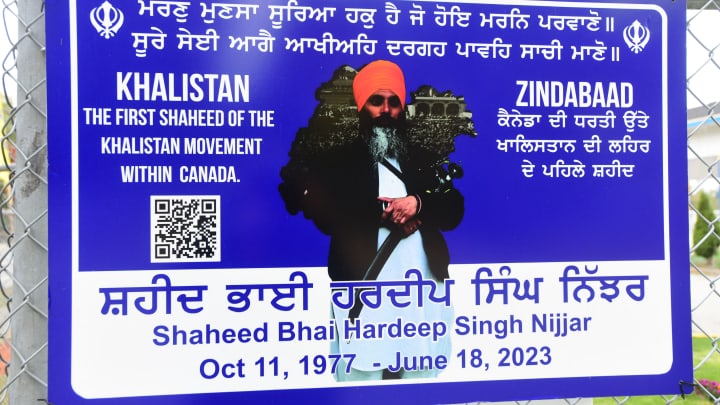
India warned its citizens to "exercise utmost caution" in Canada, deepening the diplomatic rift between both countries after Prime Minister Justin Trudeau went public with claims that New Delhi orchestrated the extra-judicial slaying of a Sikh separatist in Canada.
The Canadian government is investigating " " that Indian government agents may be connected to the murder of Hardeep Singh Nijjar, a naturalized Canadian and prominent advocate for an independent Sikh homeland known as Khalistan. India has as "baseless" and "absurd," accusing Canadian leaders of being sympathetic toward anti-India causes.
"In view of growing anti-India activities and politically-condoned hate crimes and criminal violence in Canada, all Indian nationals there and those contemplating travel are urged to exercise utmost caution," India's Ministry of External Affairs said in a
"Recently, threats have particularly targeted Indian diplomats and sections of the Indian community who oppose the anti-India agenda," the ministry added. "Indian nationals are therefore advised to avoid travelling to regions and potential venues in Canada that have seen such incidents."
Given the close relationship Canada maintains with the U.S., this escalating bilateral crisis could threaten to derail as a strategic partner in a broader Indo-Pacific alliance aimed at "de-risking" a reliance on China by realigning supply chains and restricting Chinese access to strategic technology.
Canada halted trade talks with India ahead of the recent Group of 20 nations leaders' summit in Delhi, where Trudeau said he raised the issue with his Indian counterpart, Prime Minister Narendra Modi.
India and Canada have in reciprocal moves following Trudeau's Monday announcement.
"The government of India needs to take this matter with the utmost seriousness. We are doing that, we are not looking to provoke or escalate," Trudeau told reporters on Tuesday.
This travel advisory added to public outrage in local Indian media, with even the opposition Congress Party echoing the ruling Bharatiya Janata Party that India's "fight against terrorism has to be uncompromising" .
As the ruling party, Congress eventually crushed the bloody insurgency that shook India in the 1970s and 1980s when the minority Sikhs agitated for an independent Sikh homeland in the northern Indian state of Punjab, claiming thousands of lives in the process. of the 1984 assassination of then-Prime Minister Indira Gandhi.
Still, there are underlying fears of a revival.
Sikh separatist Nijjar was reportedly helping to organize an unofficial referendum among the Sikh diaspora with the organization Sikhs For Justice when he was killed on June 18 by two masked gunmen in the parking lot of the Guru Nanak Sikh Gurdwara, the Sikh temple in Surrey, British Columbia where he was president.
New Delhi had labeled him a terrorist in 2020, accusing him of plotting multiple targeted murders through the years, allegations that Nijjar had denied. He had settled in suburban Vancouver and ran a plumbing business after apparently first migrating from India in the 1990s and gaining citizenship in March 2015.
While Canada views peaceful Sikh activism as part of free expression, India views Canada's continued tolerance as an endorsement of Sikh separatism that it regards as an infringement on its domestic affairs.
Canada is home to the largest Sikh diaspora outside of Punjab.
"Given the deteriorating security environment in Canada, Indian students in particular are advised to exercise extreme caution and remain vigilant," India's foreign ministry added in its travel advisory.
Correction: This story has been updated to accurately reflect the facts of the assassination of former Indian Prime Minister Indira Gandhi.

